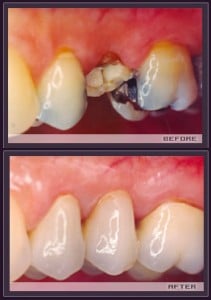An extraction is a dental procedure where a tooth is permanently removed from its socket in the jawbone. In simple terms, there are two types of extractions, routine general extractions, and surgical extractions.

Extractions that are classified as routine extractions are those where the tooth is visible in the mouth and easily grasped by forceps. These extractions are routinely performed by general dentists, using a local anesthetic.
A surgical extraction is required for a tooth that has either not yet broken through the gum or a tooth that has broken off at the gum line so it is not easily removed. Surgical extractions are performed by dentists with more advanced skills in this area.
Some surgical extractions can be performed in the dental surgery while more complicated surgical extractions may have to be performed under a general anesthetic in a day surgery or hospital. This level of surgery may be carried out by a suitably trained general dentist, oral surgeon or an oral and maxillofacial surgeon (OMFS).
Why Is It Done?
There are a number of reasons why an extraction may be required.
Tooth fracture, gum disease or decay – our dentist will attempt to repair the fractured or repaired tooth but if that is not possible, the tooth may need to be extracted.
Wisdom teeth – Wisdom teeth (third molars) come through either in your late teens or early twenties, although sometimes this can occur later in life. In some cases, there is not enough room in the mouth for these molars so they crowd the molar next to it causing pain and swelling. Sometimes one or all of the wisdom teeth become impacted which means they are unable to break through the surface of the gum which can cause pain, gum infections and sometimes decay to the wisdom tooth and/or the adjacent molar.
Not only wisdom teeth but other teeth such as canine and other molars can become impacted as well, causing the same problems.
An extraction is recommended in these circumstances
Abscessed (Infected) tooth – This is an infection of either the root of a tooth or between the gum and tooth. The most common causes of an abscess are advanced tooth decay, a severely broken down tooth or a tooth that has been affected or damaged by a severe traumatic incident. The infection may be extremely painful. Your dentist will endeavor to preserve the tooth by treating the infection but if that is not possible, the tooth may have to be extracted.
Orthodontic treatment – An Orthodontist may require the removal of permanent or deciduous teeth to free up space for the teeth that are being moved into place.
Extra teeth – In some cases there are too many teeth in the mouth due to having extra teeth. These are called supernumerary teeth. In this situation, the supernumerary teeth sometimes block other teeth from erupting into the mouth and may require extraction to free up space.
If you think you may need a tooth extracted, please contact Moore Family Dentistry today to schedule an appointment. Dr. Adam Moore serves patients in Garner and Cary, North Carolina.

